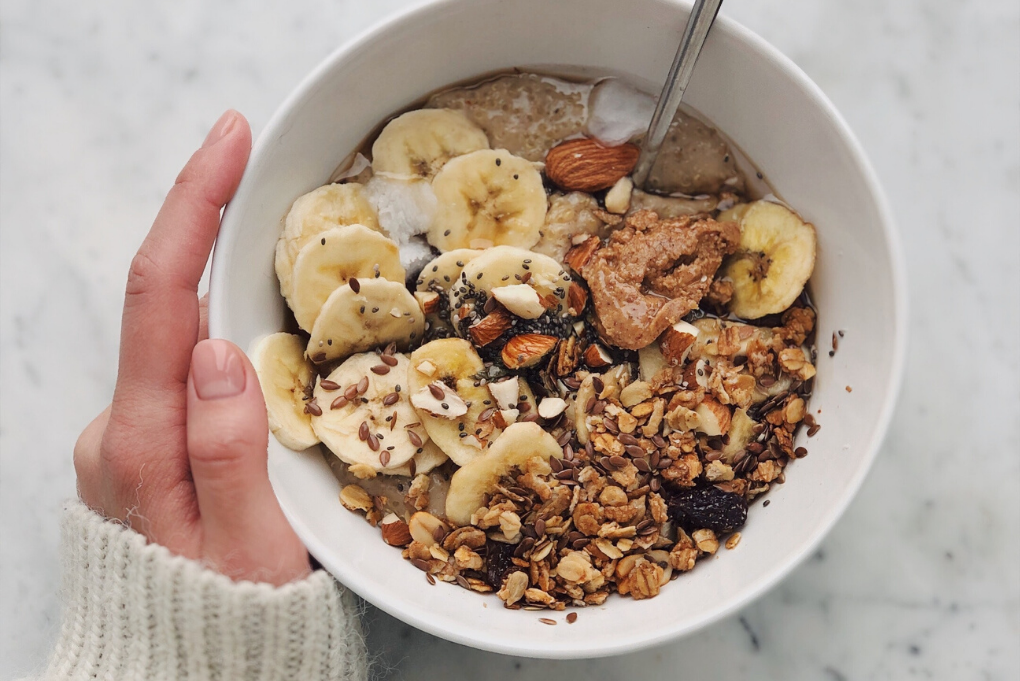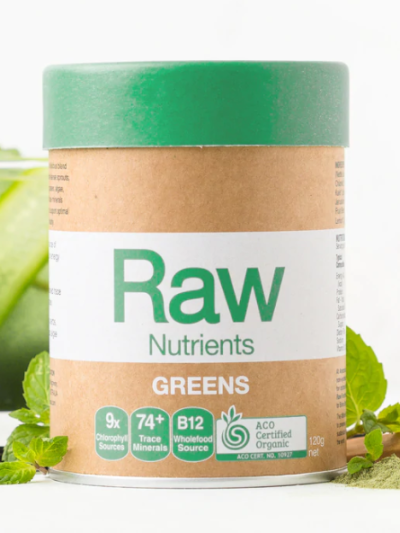Gut Health, Mental Health, Nutrition
Nourishing your gut-mind connection during Covid stress
Most people think of the gut as the digestive organs that help breakdown food. But did you know that there are trillions of microorganisms in the gut and they can do so much more than digest what we eat?
These tiny living beings are too small to be seen but have mind-blowing impacts on both our physical and mental health. This may remind you of the invisible enemy that the whole world is fighting with, but not all invisible bugs are bad!
The collection of gut microorganisms, in which we call the “gut microbiota”, has co-evolved with humans since ancient times. We now know from research that they play important roles in every stage of our life and disease.
We could go on forever about what the gut can do, but let’s just talk about the most intriguing one today – the “Gut-brain connection”.
How do the gut and brain talk to each other?
The gut-brain connection is a two-way communication network that has attracted much attention in recent years. Scientists found that changes in the gut are associated with neurodegenerative diseases, cognitive behaviours and even emotions.
In fact, we can’t live without our gut microbiota and the same goes for them. Many gut bacteria can respond to and produce neurotransmitters, which are signals in the brain that are fundamental to our complex functions.
It turns out that neurotransmitter levels can impact gut bacteria’s growth, meanwhile, bacteria can use neurotransmitters to influence our mind too. For example, more than 90% of our body’s supply of serotonin, the so-called “happy” chemical, is produced in the gut.

Moreover, mood disorders including anxiety, depression and autism are all linked to gut disorders like the “leaky gut”. When our intestinal barrier is weakened, vicious invaders can penetrate our cells and trigger gut inflammation.
When the gut is chronically inflamed, active immune cells produce pro-inflammatory cytokines, which are commonly elevated in people with depression and other stress-related disorders.
Not only can our gut affect the mind, negative emotions can also affect the gut. For example, stress is a prime culprit for making a leaky gut that is welcoming to invaders. In animal studies, chronic stress led to growth of inflammation-promoting bacteria, which increased the risk of colitis.
In mice, mental stress could dramatically change the composition of their gut microbiota, which was accompanied by activation of the stress response known as Hypothalamic-pituitary-adrenal (HPA) axis.
So now you can probably understand why we get “gut-wrenching” feelings during stressful situations. It’s because our gut is extremely sensitive to negative emotions, which have certainly been all around us lately.
Mental health check-in during COVID-19
If you have been checking the coronavirus news diligently up until now, you should probably check up on your mental health!
Most people can’t escape from the extensive media coverage on COVID, which is filled with negative words like “death”, “crisis” and “isolation”.
Unfortunately, we are also forced to adapt to this invisible enemy socially and financially. For many, unemployment, living alone and remote working have been terribly stressful.
Even worse, our usual “de-stress rituals” like meeting up with friends and hitting the gym are no longer available. All of these factors can have a far-reaching impact on our mental health.
But we just learned that stress contributes to gut imbalance, which in turn, worsens our brain health. How can we stop this vicious cycle?

How to improve gut and mental health?
Fortunately, there are ways to improve our gut health and mental health altogether.
Research has shown that friendly gut bacteria such as the Lactobacillus produce healthy short-chain fatty acids (SCFAs) which are antidotes to pro-inflammatory cytokines. These helpers can also reduce stress hormone levels, anxiety and depression.
So, the best way to improve our gut and mind is to nourish a health microbiota using diet.
We know from research that health-promoting bacteria thrive on fibre, which comes primarily from plant-based foods.
On the contrary, a diet high in fat, sugar and additives has the exact opposite effect of damaging gut health.
If you have heard of the old saying “you are what you eat”, now you know that it’s true!
Apart from diet, you can also protect your gut by avoiding other poor lifestyle habits, including sleep deprivation, smoking and drinking.
If you visit a pharmacy, you will notice a range of probiotic supplements that may help improve your gut health. These work by rapidly giving you some beneficial bacteria such as the Lactobacillus that we mentioned.
In fact, there is some evidence that taking a combination of Lactobacillus spp. and Bifidobacterium once daily for three months could potentially improve mental health and reduce inflammation.
Nevertheless, probiotics alone is not enough as you still need to feed friendly bacteria with plenty of fiber to help them thrive. And depending on the level of inflammation within your gut you may require specific supplementation to help soothe and heal the gut lining.
Bottom line
In closing, there is a lot of communication between our brain and gut. The next time that you think about the gut, see it not as a digestive system, but a home to many important microorganisms.
Although the coronavirus pandemic has been taking a toll on our health, it’s never too late to change.
Improving gut health is a matter of making healthy lifestyle choices. You can start small by eating more veggies or trying out a guided meditation app today!
If you found this article helpful you can share it using icons below ♥
- Appleton, J., 2018. The gut-brain axis: Influence of microbiota on mood and mental health. Integrative Medicine (Boulder), 17(4), pp.28–32.
- Kennedy, P.J. et al., 2012. Gut memories: towards a cognitive neurobiology of irritable bowel syndrome. Neuroscience and biobehavioral reviews, 36(1), pp.310–340.
- Kelly, J.R. et al., 2015. Breaking down the barriers: the gut microbiome, intestinal permeability and stress-related psychiatric disorders. Frontiers in cellular neuroscience, 9, p.392.
- Javier A. Bravo et al., 2011. Ingestion of Lactobacillus strain regulates emotional behavior and central GABA receptor expression in a mouse via the vagus nerve. Proceedings of the National Academy of Sciences, 108(38), pp.16050–16055.
- Cryan, J. & Dinan, T., 2012. Mind-altering microorganisms: the impact of the gut microbiota on brain and behaviour. Nature Reviews. Neuroscience, 13(10), pp.701–12.
- Yano, J. et al., 2015. Indigenous Bacteria from the Gut Microbiota Regulate Host Serotonin Biosynthesis. Cell, 161(2), pp.264–276.
- van den Elsen, L.W.J. et al., 2017. Embracing the gut microbiota: the new frontier for inflammatory and infectious diseases. Clinical & Translational Immunology, 6(1), p.n/a.
- Gao, Xinghua et al., 2018. Chronic stress promotes colitis by disturbing the gut microbiota and triggering immune system response. Proceedings of the National Academy of Sciences of the United States, 115(13), pp.E2960–E2969.
- Gareau, M.G. et al., 2008. Pathophysiological mechanisms of stress-induced intestinal damage. Current Molecular Medicine, 8(4), pp.274-81.
- Hill, Colin et al., 2014. The International Scientific Association for Probiotics and Prebiotics consensus statement on the scope and appropriate use of the term probiotic. Nature Reviews Gastroenterology & Hepatology, 11(8), pp.506–514.
- Ioana A. Marin et al., 2017. Microbiota alteration is associated with the development of stress-induced despair behavior. Scientific Reports, 7(1), p.43859.
- Karl, J.P. et al., 2018. Effects of Psychological, Environmental and Physical Stressors on the Gut Microbiota. Frontiers In Microbiology, 9, p.2013.
- Fung, T.C., 2020. The microbiota-immune axis as a central mediator of gut-brain communication. Neurobiology of Disease, 136, p.104714.
- Venegas, D. et al., 2019. Short Chain Fatty Acids (SCFAs)-Mediated Gut Epithelial and Immune Regulation and Its Relevance for Inflammatory Bowel Diseases. Frontiers In Immunology, 10, p.277.
- Sanders, M.E. et al., 2019. Probiotics and prebiotics in intestinal health and disease: from biology to the clinic. Nature Reviews Gastroenterology & Hepatology, 16(10), pp.605–616
- Kouchaki, E. et al., 2017. Clinical and metabolic response to probiotic supplementation in patients with multiple sclerosis: A randomized, double-blind, placebo-controlled trial. Clinical Nutrition, 36(5), pp.1245–1249.




